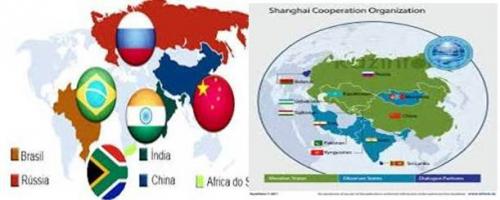The war against BRICS
The IMF, with the US at their head, desperately attempt to impose a conservative restoration at the world level, so that everything returns to the old hegemony.
- Opinión

The war against BRICS continues. The hegemonic country, the United States, together with their central satellites, persist in the attempt to blame the present cooling of the world economy on the emerging countries. This will not end. The IMF employs its annual report on previsions of economic growth to situate the focus outside of the capitalist epicentre. And it does it as it knows how to: abusing its dominant position to project a preoccupying panorama for China, Russia, Brazil, India and South Africa. In this way, they attempt to move the attention away from the real structural problems of the world capitalist system. They avoid discussing the subordination of the real economy in the face of neoliberal financialisation.
What does the IMF say as the guarantor of an economic system that allows for 90% of capital movements that are not productive? What is the economic policy of the IMF with respect to a financial sector that is 18.1% larger than the real economy? Why does it not prohibit the existence of vulture funds that attempt to destabilize the economies of many countries? Why does it not dedicate its reports to demand the fulfillment of concrete norms to end the privileged connection between the transnationals and fiscal paradises? No. The IMF prefers to clarify nothing about the evasion of 11.5 trillion dollars that almost no one knows where they are. On the contrary, the IMF singles out all those countries that do not obey them with the sole aim of saving "their system" that is not remotely beneficial for the majority of society.
In this offensive against BRICS anything goes: it includes distorting the figures on economic growth to indicate a relative stagnation in the emerging economies compared to traditional powers. But the small print does not betray. The data speak for themselves and it is by no means true that the emerging countries are those that grow the least nor are they responsible for the economic contraction on a world scale. The IMF itself estimates that the GDP of this group of countries grows at 4% while the so called advanced countries grow at 2%. Moreover, if we compare China with Germany or Japan, the result is even more enlightening. The IMF estimates that the Chinese GDP will grow at 6.8% in 2015 while Germany will grow at 1.5% and Japan at 0.6%
The figures do not add up, in spite of the fact that the IMF repeats the same headline: "The braking of the emerging countries is cooling world growth" (El País, 6 octobre 2015). "The emerging countries threaten to pull the world into a new recession" (Financial Times, September 7, 2015). This attack on the BRICS is not by chance. The United States is out to win the battle of expectations with the intention of preventing the present geoeconomic transition (towards the multipolar world). The Federal Reserve has for several months announced a rise in interest rates that never happens. The objective is to create expectations at a global level so that capitals that left a decade ago will come home for Christmas. Neither the IMF nor the United States are happy that the BRICS continue to consolidate such a large and solid geoeconomic space, with such a global spread. The recent creation of the Asia Infrastructure Investment Bank (AIIB) which some 57 countries have joined (among them the BRICS, plus Germany, the United Kingdom, France, Italy, Australia, Spain, South Korea, Israel), also disturbs them. The new financial diplomacy of China is quite disturbing for the IMF. The Beijing Consensus, as many now call it, acts as a counterweight to the Washington Consensus. The IMF is not alone in this world. They know what is happening and because of this, they react against BRICS and against any country that does not conform to their mandate. Thus, the attempt to create a common global current of opinion, in economic affairs, that everything is the fault of BRICS and the emerging countries. In this way the IMF, with the United States at their head, desperately attempt to impose a conservative restoration at the world level, so that everything returns to the old hegemony, that of the XX Century, although sometimes they forget that we are now in the XXI Century.
Today more than ever the geopolitical dispute is moving to the geoeconomic terrain. Although one might also say this in reverse, as Argentine President Cristina Fernández phrased it: "it isn’t the economy, stupid, it’s geopolitics!"
08/10/2015
(Translated for ALAI by Jordan Bishop)
- Alfredo Serrano Mancilla is Director of CELAG, Doctor in Economy, @alfreserramanci
Del mismo autor
- Bolivia, la victoria de las convicciones 20/10/2020
- Millones de nuevos pobres en Bolivia 28/09/2020
- Misión imposible en Ecuador 20/07/2020
- Bolivia en disputa 08/07/2020
- El impuesto a los ricos como sentido común 23/06/2020
- La reforma tributaria que necesitamos 05/06/2020
- Consenso para la transición económica 27/04/2020
- La era de la imprecisión y la incertidumbre 14/04/2020
- La hora de la condonación de la deuda para América Latina 20/03/2020
- La nueva economía postcoronavirus 18/03/2020
Clasificado en
Clasificado en:
Crisis Económica
- Geraldina Colotti 07/04/2022
- Julio C. Gambina 07/04/2022
- Rafael Bautista S. 06/04/2022
- Julio Gambina 04/04/2022
- José Ramón Cabañas Rodríguez 01/04/2022
BRICS
- Valter Pomar 28/10/2016
- Tereza Cruvinel 19/10/2016
- Walden Bello 08/10/2015
- Alfredo Serrano Mancilla 08/10/2015
- Mauro Santayana 24/07/2015








